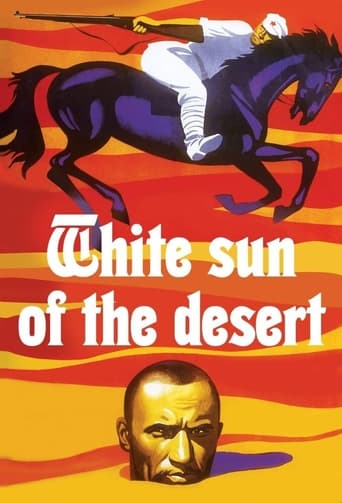vladislavmanoylo
White Sun of the Desert is a very entertaining and bold movie, to put it simply it's a crowd-pleasing movie. This movie is very good at being what it is, so while it doesn't exist in the realms of high art or ground-breaking experiences, it's certainly worth watching to someone wanting to enjoy an action-adventure with some decent comedy throughout.The hero is a slightly more Russian classic action hero - impossibly competent and reliable, full of charm and wit, trying to get home to his peaceful life and adored wife but is entangled into a mess caused by the villain. A picture of his character can be almost entirely given in two scenes- while he has the villain cornered he nonchalantly releases a rope resulting in a henchman being knocked out on the other side of a wall; and in a scene where he is cornered instead and the enemies ask him if he would prefer a quick death or a torturous one, he naturally and nonchalantly answers that he would prefer torture- and almost immediately afterwards escapes from his captives with his reflexes and good aim.The villain is of course capable of despicable acts, talks very friendly to the people he is trying to kill, and is bound to lose. There are of course other characters and aspects to the film, but the hero is the driving force to the extent that, much like James Bond or Sherlock Holmes, another setting with him would produce a very similar film. Other than the conflict between the characters of the hero and villain, another central conflict is the one between cultures of the two. But that conflict is presented through characters and not necessarily philosophy or politics as might be expected from a soviet union film.Overall this movie is just fun. It's comfortable trading realism for more exciting scenes, and somewhat trading complexity in characters for likability. It's enough to make the audience care for what happens to the characters and their struggles, and its worth watching.
anweinandy
White sun of the desert was a very interesting film. It seemed to revolve around the idea of duty. It often presented different characters with a challenge that they had to rise to and overcome in whatever way they knew how. The different ways that this idea manifested itself was the interesting part. Not every hero in the film was equal. Some of them were characters that possessed traits that were far from desirable but this was not always the case. For example, the main character Sukhov was making his journey home when he was given the task of escorting a group of women across the desert. He rejected this task at first but when the women were left with him he rose to the occasion and did whatever was necessary to protect them until they reached their destination. In the beginning of the film Sukhov find and saves Sayid from death. Throughout the film Sayid repeatedly leaves to peruse his own goal of avenging his father's death, but he always seems to return when his services are needed to help protect the group of women. Another unlikely hero in the film is Vereshchagin, a drunkard that clings to his past experiences of grandeur. This character is told by his wife not to get involved in Sukhov's problem but when he is truly needed he also does what is necessary and aids Sukhov in battle.This was a very fun film to watch. It was very interesting to watch the different types of heroes that all rose to the occasion and did what they needed to do. Sukhov was the only character in the story that was not flawed in very obvious ways, but even the characters with problems were able to give what they had to the cause. This made me think of the soviet state and how it may have wanted to deliver the message that even if one is not perfect the state would not be able to exist and function without them. Everyone had to play a part that was necessary in order to complete the goal.
psbarlo-1
I have seen the impact that the American Western had on the Italians ("The Good, the Bad, and the Ugly") and now I have seen its influence of the Russians. This "Ostern" tackles the subject matter of civil war, bigamy, and death with a wonderful lack of pretense that is expected from a John Wayne movie; all that has changed are the ideologies. With a little more in common with "Lawrence of Arabia" than just sand the movie focuses on an unextraordinary man forced to rise to the occasion of being a hero. The lead is extremely engaging as a man who never looses his laid-back attitude even as soldiers pour oil around him and the many wives. His fidelity to his farm wife provides for the movie's highlight. He imagines his wife surrounded by the entire harem performing chores around the field. The clashing of East and... well, further East provides for many comical situations. The way the harem acts around the men in the museum is countered by the men lusting after them.
hannu22
I like this movie very much. It is even useful, I can keep my Russian on good level by watching it from time to time, it is really possible to watch it over and over again. DVD with subtitles is great with extras including the story of the film by the director, which I found very interesting. You can learn some 'classical' aphorisms from this movies. Like the one Vershagin says 'I feel sorry for the superpower..' really actual after the collapse of the Soviet Union. Letters from Sukhov to his wife are also pearls of this film. The scale of Sukhov is also amazing, from a warrior to lyrical romantics through a good fellow with vodka.


